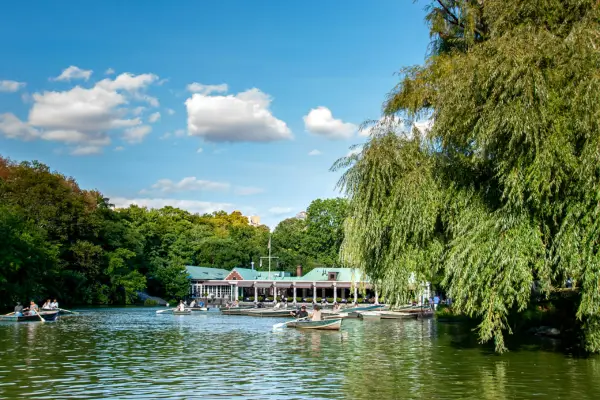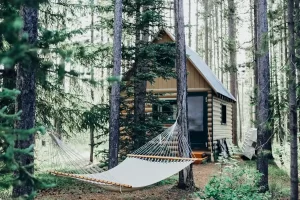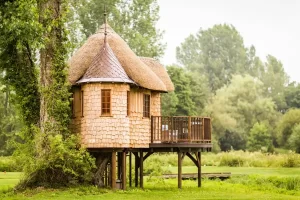In a world where the impacts of climate change are becoming increasingly evident, the way we travel is undergoing a transformation. More and more travelers are seeking out experiences that not only immerse them in the beauty of nature but also protect and preserve it. This shift has led to a surge in demand for eco-friendly travel, where luxury no longer means excess, but rather a harmonious balance with the environment. From lush rainforests to remote islands, eco-lodges and green hotels are at the forefront of this movement, offering unique stays that combine comfort, sustainability, and a deep connection to the natural world.
Eco-conscious accommodations play a vital role in environmental preservation. By choosing to stay in an eco-lodge or green hotel, travelers contribute to the conservation of natural resources, support local communities, and help mitigate the negative impacts of tourism. These establishments often use renewable energy, minimize waste, conserve water, and engage in local conservation efforts, all of which are crucial steps in reducing the overall carbon footprint of travel. In an era where every choice matters, opting for an eco-friendly stay is a powerful way to make a positive impact on the planet.
In this article, we will take you on a journey through some of the top eco-lodges and green hotels around the world. From the savannas of Africa to the serene coasts of the Maldives, we will explore how these havens of sustainability are redefining what it means to travel responsibly. Whether you’re planning your next getaway or simply dreaming of a future adventure, these eco-friendly escapes offer the perfect blend of luxury, nature, and sustainability.
What Makes a Hotel Eco-Friendly?
Sustainable Practices
Eco-lodges and green hotels stand out for their commitment to sustainability, which is evident in every aspect of their operation. One of the most significant features of these establishments is their use of renewable energy sources, such as solar, wind, or hydroelectric power, which drastically reduces their carbon footprint. In addition to energy conservation, these properties prioritize waste management by implementing comprehensive recycling programs, composting organic waste, and reducing single-use plastics. Water conservation is another critical focus, with many eco-lodges employing rainwater harvesting systems, low-flow fixtures, and greywater recycling to minimize water usage. These sustainable practices not only lessen the environmental impact but also set a standard for responsible hospitality in the industry.
Certifications to Look For
When evaluating the eco-friendliness of a hotel or lodge, certifications can serve as a reliable indicator of their commitment to sustainability. One of the most recognized certifications is LEED (Leadership in Energy and Environmental Design), which assesses buildings on criteria such as energy efficiency, water usage, and indoor environmental quality. The Green Key certification is another global standard, focusing on environmental management, social responsibility, and energy efficiency. EarthCheck is a certification that emphasizes environmental and social performance, particularly in areas like greenhouse gas emissions, waste management, and conservation efforts. By choosing accommodations with these certifications, travelers can be confident that they are supporting businesses that meet rigorous sustainability standards.
Importance of Local Community Engagement
A truly eco-friendly hotel or lodge goes beyond environmental practices and also engages meaningfully with the local community. These establishments often work closely with local artisans, farmers, and service providers, ensuring that tourism benefits the local economy. By sourcing food locally, hiring staff from nearby communities, and promoting cultural heritage, eco-lodges and green hotels foster economic growth and preserve the cultural integrity of the region. Additionally, many of these properties contribute to community development projects, such as education, healthcare, or conservation initiatives, further enhancing their positive impact. This holistic approach not only enriches the guest experience but also ensures that the benefits of tourism are shared with those who live in the surrounding areas.
Top Eco-Lodges Around the World
Africa
- Singita Kwitonda Lodge, Rwanda:
Nestled at the edge of Volcanoes National Park, Singita Kwitonda Lodge offers a luxurious yet eco-conscious experience that plays a vital role in gorilla conservation. The lodge is part of Singita’s broader commitment to wildlife preservation, with a focus on protecting the endangered mountain gorilla population. The architecture of the lodge blends seamlessly with the surrounding landscape, using locally sourced materials and sustainable design principles to minimize environmental impact. Every aspect of the lodge, from its energy-efficient lighting to its rainwater harvesting systems, reflects a deep respect for the natural environment and the local communities. - Chumbe Island Coral Park, Zanzibar:
Chumbe Island Coral Park is a shining example of how tourism can support marine conservation and promote sustainability. Located off the coast of Zanzibar, this eco-lodge is situated within a fully protected marine reserve, home to a pristine coral reef and a diverse array of marine life. The lodge’s design is entirely zero-impact, featuring solar power, composting toilets, and rainwater catchment systems. By staying at Chumbe Island, guests directly contribute to the preservation of this delicate ecosystem, while also enjoying a unique, off-the-grid experience that prioritizes environmental stewardship.
Asia
- Six Senses Ninh Van Bay, Vietnam:
Set against the backdrop of dramatic mountains and crystal-clear waters, Six Senses Ninh Van Bay offers a luxurious retreat that is deeply connected to the natural landscape. The resort’s villas are designed to blend into their surroundings, with minimal disruption to the local flora and fauna. Sustainability initiatives at the resort include an organic garden that supplies the on-site restaurants, waste management programs, and the use of energy-efficient technologies. The resort also actively participates in local conservation efforts, including protecting endangered species and supporting community-based environmental programs. - Soneva Fushi, Maldives:
Soneva Fushi, located in the Maldives, is a pioneer in sustainable luxury, with a strong focus on waste-to-wealth initiatives and coral reef restoration. The resort has implemented an ambitious recycling program that turns waste into resources, such as compost and construction materials. Additionally, Soneva Fushi is committed to protecting the surrounding coral reefs, with ongoing projects that involve coral planting and reef monitoring. The resort’s dedication to sustainability is evident in every detail, from its solar-powered villas to its commitment to sourcing local and organic ingredients for its restaurants.
Europe
- Eagle Brae, Scotland:
Eagle Brae is a unique eco-lodge located in the Scottish Highlands, where guests can experience the beauty of nature in handcrafted log cabins powered entirely by renewable energy. The cabins are built from sustainably sourced timber and feature green roofs that blend into the landscape. Eagle Brae’s commitment to wildlife conservation is evident in its efforts to create habitats for local species, including red deer and golden eagles. The lodge also prioritizes sustainability in its operations, from using hydroelectric power to encouraging guests to participate in conservation activities. - Ion Adventure Hotel, Iceland:
Perched in the heart of Iceland’s rugged landscape, Ion Adventure Hotel is a beacon of sustainable hospitality. The hotel is powered by geothermal energy, a renewable resource that is abundant in Iceland, and its design incorporates materials that reflect the surrounding environment. The hotel’s restaurant focuses on sustainable dining practices, using locally sourced ingredients to create dishes that highlight the flavors of Iceland. Additionally, Ion Adventure Hotel is committed to reducing its environmental impact through energy-efficient technologies and eco-friendly amenities.
Americas
- Hacienda Tres Ríos, Mexico:
Located on the Riviera Maya, Hacienda Tres Ríos is an eco-resort that combines luxury with a deep commitment to environmental preservation. The resort is built within a natural park that protects 10 cenotes—natural sinkholes filled with water—and a vast mangrove forest. Hacienda Tres Ríos uses solar energy to power its operations and has implemented water conservation measures to protect the region’s fragile ecosystem. Guests can explore the resort’s natural surroundings through guided eco-tours, which highlight the importance of preserving the area’s unique biodiversity. - Inkaterra Machu Picchu Pueblo Hotel, Peru:
Situated near the iconic Machu Picchu, Inkaterra Machu Picchu Pueblo Hotel is a model of sustainable tourism that focuses on biodiversity and cultural preservation. The hotel is set within a private ecological reserve that is home to hundreds of species of plants, birds, and butterflies. Inkaterra is dedicated to preserving the region’s natural heritage, with reforestation programs and organic farming initiatives. The hotel also supports local communities by promoting traditional Andean culture and providing education and employment opportunities for residents.
Australia & Oceania
- Bamurru Plains, Australia:
Bamurru Plains is a remote eco-lodge located on the edge of Kakadu National Park in Australia, offering an immersive experience in one of the country’s most diverse ecosystems. The lodge is designed to have a minimal environmental footprint, with solar power providing energy and sustainable materials used in its construction. Guests can explore the surrounding wilderness through guided safaris that focus on the region’s rich wildlife and cultural history. Bamurru Plains exemplifies how luxury and sustainability can coexist in even the most remote locations. - Treetops Lodge & Estate, New Zealand:
Nestled in the heart of a 2,500-acre forest, Treetops Lodge & Estate in New Zealand offers an eco-friendly escape that prioritizes conservation and sustainability. The lodge is built using eco-friendly construction methods, with a design that blends seamlessly into the surrounding forest. Treetops is committed to forest conservation, with programs in place to protect the local flora and fauna and restore native habitats. The lodge also emphasizes sustainable living, with organic gardens, rainwater harvesting, and a focus on reducing waste throughout its operations.
Top Green Hotels for an Eco Escape
Urban Green Retreats
- 1 Hotel Central Park, New York City:
Nestled in the heart of Manhattan, 1 Hotel Central Park offers a serene urban retreat that embodies the principles of biophilic design—a concept that seeks to connect guests with nature even in the middle of a bustling city. The hotel’s interiors feature reclaimed wood, living green walls, and natural materials that create a calming atmosphere and reduce the environmental impact of construction. Beyond aesthetics, 1 Hotel Central Park is deeply committed to sustainability, with efforts to reduce its carbon footprint through energy-efficient lighting, water conservation systems, and a zero-waste policy. The hotel’s farm-to-table restaurant sources ingredients locally, further minimizing its environmental impact while offering guests a taste of New York’s finest sustainable cuisine. - Zoku Amsterdam, Netherlands:
Zoku Amsterdam redefines urban living with its innovative approach to sustainability. This hybrid hotel-living space features rooftop gardens that not only provide fresh produce for the on-site restaurant but also improve air quality and reduce the building’s heat absorption. Zoku’s rooms are designed with multifunctional furniture that maximizes space and minimizes waste, embodying the concept of sustainable living in a compact urban environment. The hotel also promotes eco-friendly practices such as waste separation, energy-efficient lighting, and the use of sustainable materials in its construction and decor. Guests at Zoku can enjoy a modern, minimalist aesthetic while knowing that their stay supports a greener urban future.
Luxury Green Hotels
- Bardessono Hotel & Spa, California:
Bardessono Hotel & Spa in California’s Napa Valley is a shining example of how luxury and sustainability can coexist. The hotel has earned LEED Platinum certification, the highest standard for environmental design, thanks to its extensive use of solar energy, geothermal heating and cooling, and water-saving technologies. The architecture of Bardessono is inspired by the natural beauty of the surrounding vineyards, with a focus on using locally sourced and sustainable materials. The hotel’s spa offers treatments using organic products, and its restaurant features a menu crafted from seasonal, locally grown ingredients. Bardessono’s commitment to sustainability is evident in every detail, offering guests an indulgent yet eco-friendly experience. - The Scarlet, Cornwall, UK:
Perched on the rugged cliffs of Cornwall, The Scarlet is a luxury eco-hotel that combines natural wellness with sustainable practices. The hotel’s design emphasizes harmony with the environment, with eco-friendly materials, green roofs, and large windows that offer stunning views of the coastline while maximizing natural light. The Scarlet’s spa focuses on holistic treatments using organic products and natural elements like seaweed and clay. The hotel is also committed to reducing its environmental footprint through initiatives such as rainwater harvesting, solar panels, and a biomass boiler. Guests can relax and rejuvenate in a setting that is as kind to the planet as it is to their well-being.
Budget-Friendly Green Stays
- Hi-Hosbos Eco Hostel, Costa Rica:
Hi-Hosbos Eco Hostel in Costa Rica is a budget-friendly option for travelers looking to make a positive impact while exploring the country’s rich biodiversity. The hostel is built using local materials such as bamboo and recycled wood, and its design is focused on minimizing energy use through natural ventilation and lighting. Hi-Hosbos is also deeply embedded in the local community, offering guests opportunities to participate in cultural activities and environmental projects. The hostel’s communal atmosphere encourages guests to connect with each other and with the surrounding environment, making it an ideal choice for eco-conscious travelers seeking an authentic Costa Rican experience. - Ecolodge Chepu Adventures, Chile:
Located in the remote wilderness of Chiloé Island, Ecolodge Chepu Adventures offers an off-grid experience that highlights the beauty of low-impact tourism. The lodge is powered entirely by renewable energy, with solar panels and wind turbines providing electricity, and rainwater collected for all water needs. The buildings are constructed from locally sourced materials, and the lodge’s operations are designed to minimize waste and reduce environmental impact. Guests can explore the surrounding forests and wetlands on guided tours that emphasize conservation and sustainability. Ecolodge Chepu Adventures is perfect for travelers looking to disconnect from the modern world and reconnect with nature in a sustainable and responsible way.
How to Choose the Right Eco-Friendly Accommodation
Research and Reviews
When planning an eco-friendly getaway, it’s essential to do your homework to ensure that your chosen accommodation genuinely upholds sustainable practices. Start by researching the property’s website and looking for specific information about their eco-credentials, such as energy conservation measures, waste management systems, and community involvement. Certifications like LEED, Green Key, or EarthCheck can serve as reliable indicators of a property’s commitment to sustainability. In addition to official certifications, reading customer reviews on platforms like TripAdvisor or Google can provide insight into how well the property implements its eco-friendly policies in practice. Look for comments that mention sustainability efforts, such as reduced plastic use, organic food sourcing, or participation in conservation projects. This due diligence will help you avoid “greenwashing” and ensure that your stay supports a genuinely eco-conscious business.
Understanding Your Impact
Choosing eco-friendly accommodations is just one part of reducing your travel footprint. To fully understand your impact, consider how the property integrates sustainability into every aspect of your stay. For example, think about how the hotel manages resources like water and energy, whether they use renewable energy sources, and how they handle waste disposal. Assess the property’s food sourcing practices—do they offer local, organic, and seasonal ingredients? Consider how your stay will affect the local environment and community. Opt for hotels that actively support local economies by employing local staff, sourcing materials locally, and engaging in community development initiatives. By reflecting on these factors, you can make informed choices that contribute to the well-being of both the environment and the communities you visit.
Booking Directly with Eco-Friendly Accommodations
Once you’ve identified an eco-friendly accommodation that aligns with your values, consider booking directly through their website or contact them directly. This approach ensures that a larger portion of your payment goes directly to the property, allowing them to reinvest in their sustainability efforts. Many eco-lodges and green hotels rely heavily on direct bookings to maintain their operations and fund conservation initiatives. Additionally, booking directly can often provide you with more detailed information about the property’s eco-friendly practices, and you might even discover exclusive offers or packages tailored to environmentally conscious travelers. By choosing to book directly, you’re not only securing your stay at a sustainable property but also supporting their ongoing commitment to protecting the planet.
Conclusion
Choosing eco-lodges and green hotels is more than just a trend—it’s a vital step towards responsible and sustainable travel. These accommodations offer a unique blend of comfort, luxury, and environmental stewardship, ensuring that your vacation leaves a positive impact on both the planet and the local communities. From urban green retreats to remote eco-lodges, the options are diverse, catering to different tastes and budgets while prioritizing sustainability. By selecting these eco-conscious properties, travelers can reduce their carbon footprint, support conservation efforts, and contribute to the preservation of natural and cultural heritage.
As you plan your next vacation, consider making eco-friendly accommodations a priority. Whether you’re seeking luxury, adventure, or a budget-friendly escape, there’s a green option out there that aligns with your values. By choosing to stay at an eco-lodge or green hotel, you’re not just booking a place to sleep—you’re making a commitment to travel in a way that respects and protects the planet. So, take that step and make your next trip one that contributes to a more sustainable future.
In a world facing unprecedented environmental challenges, every choice we make matters. Conscious travel is about more than just seeing new places; it’s about preserving those places for future generations to experience and enjoy. By embracing eco-friendly accommodations, we play a crucial role in safeguarding the beauty and diversity of our planet. Together, we can ensure that our love for travel doesn’t come at the expense of the earth but instead helps to protect and nurture it for years to come.




